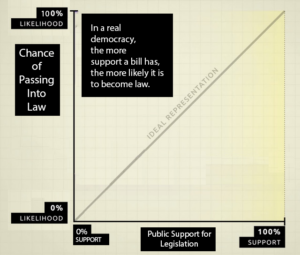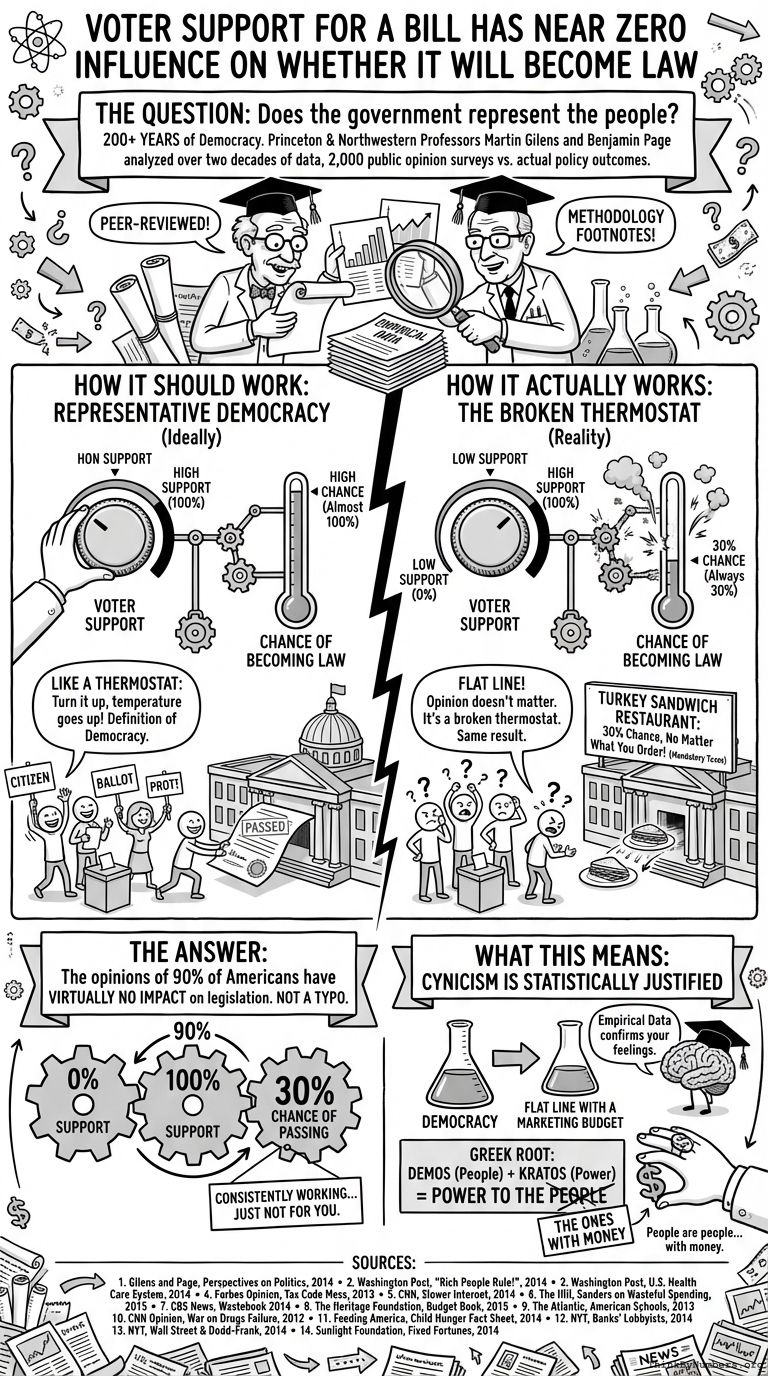The Question
Does the government represent the people?
It's a simple question. You'd think after 200+ years of democracy, someone would have checked by now.
Professors Martin Gilens and Benjamin Page analyzed over two decades of data to find out. They examined nearly 2,000 public opinion surveys and compared them to actual policy outcomes.
These are Princeton and Northwestern professors. Not random people on the internet. Actual academics who use peer review and methodology sections. The kind of people who footnote everything.
The Answer
The opinions of 90% of Americans have virtually no impact on legislation.
That's not a typo. Ninety percent. The vast majority of citizens in a democracy have no measurable influence on what laws pass. Which raises the question: What exactly does "democracy" mean?
How It Should Work
In a representative democracy, the more people support a bill, the more likely it becomes law.

That line should go up. It's not complicated. More support equals more likelihood of passage. That's literally the definition of representative democracy.
Like how a thermostat works. You turn it up, the temperature goes up. You wouldn't keep a thermostat that stayed at the same temperature no matter what you set it to. That would be a broken thermostat.
How It Actually Works
Whether 0% or 100% of Americans support a policy, it has about a 30% chance of becoming law.

That's a flat line. Your opinion doesn't matter. The data checked.
Zero percent support? 30% chance it passes. One hundred percent support? Still 30% chance. Those are the same number. That's how you know the system is working. Consistently. Just not for you.
It's like if you went to a restaurant and no matter what you ordered, they brought you a turkey sandwich 30% of the time. You'd stop going to that restaurant. But with government, you can't stop going. You're legally required to pay taxes to the turkey sandwich restaurant.
What This Means
You live in a system where public support has no measurable effect on policy outcomes. The research is from Princeton and Northwestern. The methodology is peer-reviewed. The results are not subtle.
Whether you support something unanimously or oppose it unanimously makes no statistical difference to whether it happens.
That's not a democracy. That's a flat line with a marketing budget.
If you ever feel cynical about politics, congratulations. You're responding appropriately to empirical data. Your cynicism is statistically justified.
The word "democracy" comes from Greek. "Demos" meaning people and "kratos" meaning power. So democracy means "power to the people." Which is technically true. The people just happen to be the ones with money. People are people, after all.
Sources:
- Gilens and Page, "Testing Theories of American Politics: Elites, Interest Groups, and Average Citizens," Perspectives on Politics, 2014
- Washington Post, "Rich People Rule!" 2014
- Washington Post, "Once again, U.S. has most expensive, least effective health care system in survey," 2014
- Forbes Opinion, "The tax code is a hopeless complex, economy-suffocating mess," 2013
- CNN, "Americans pay more for slower Internet," 2014
- The Hill, "Sanders requests DOD meeting over wasteful spending," 2015
- CBS News, "Wastebook 2014: Government's questionable spending," 2014
- The Heritage Foundation, Budget Book, 2015
- The Atlantic, "American schools vs. the world: expensive, unequal, bad at math," 2013
- CNN Opinion, "War on drugs a trillion-dollar failure," 2012
- Feeding America, Child Hunger Fact Sheet, 2014
- New York Times, "Banks' lobbyists help in drafting financial bills," 2014
- New York Times, "Wall Street seeks to tuck Dodd-Frank changes in budget bill," 2014
- Sunlight Foundation, "Fixed Fortunes: Biggest corporate political interests spend billions, get trillions," 2014



Comments